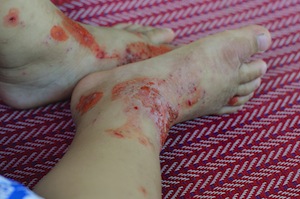
Arterial ulcers, a serious health condition affecting the legs, should never be ignored due to their potential complications and the underlying circulatory problems they signify. Understanding the early signs, causes, types, and treatments of leg ulcers is essential for effective management and prevention.
What Are the First Signs of a Leg Ulcer?
The first signs of a leg ulcer include pain, especially when the legs are elevated, and relief when dangled over the edge of a bed. Skin changes such as thinning, paleness, and tightness can also be indicators, often preceding the development of open wounds. A noticeable reduction in hair growth on the legs and feet may also occur.
Cause of Leg Ulcers
Arterial ulcers occur due to poor blood circulation in the arteries, where blood struggles to flow from the heart to other parts of the body, commonly affecting the lower extremities. This poor circulation leads to decreased oxygen and nutrient delivery to tissues, ultimately resulting in cell death and ulcer formation.
What Are Different Types of Leg Ulcers?
Leg ulcers can be classified into several types, the most common being venous, arterial, and neuropathic ulcers. Arterial ulcers are specifically caused by poor arterial circulation and typically appear on the feet and toes, often characterized by their “punched-out” appearance.
What Are Leg Ulcer Treatment Options?
Treatment for arterial ulcers focuses on restoring adequate blood flow to the affected area. This may involve medications to improve blood flow, specialized wound care dressings, and possibly surgical interventions such as angioplasty or bypass surgery. Pain management and infection prevention are also critical components of treatment.
How to Prevent a Leg Ulcer
Preventing leg ulcers involves managing risk factors such as smoking, diabetes, high blood pressure, and high cholesterol. Regular exercise and a healthy diet can improve circulation and overall health, reducing the risk of ulcers. Additionally, individuals with circulation problems should regularly inspect their legs and feet for any signs of skin damage or changes and seek early medical advice if symptoms appear.
Ignoring an arterial ulcer can lead to severe complications, including infection, increased pain, and even amputation. Early detection and treatment are crucial for a favorable outcome. At DFW Wound Care Center, we specialize in the treatment of common and complex wounds, utilizing advanced wound care techniques across our multiple locations in Plano, Lewisville, Irving, and DeSoto. Our skilled team is ready to address the unique needs of each patient with immediate openings currently available. If you suspect you have an arterial ulcer or any wound concerns, do not hesitate to contact us. Use our online form for convenience and take the first step toward effective treatment and recovery.
Contact us
Schedule an appointment
with our specialists by contacting us or calling our:
